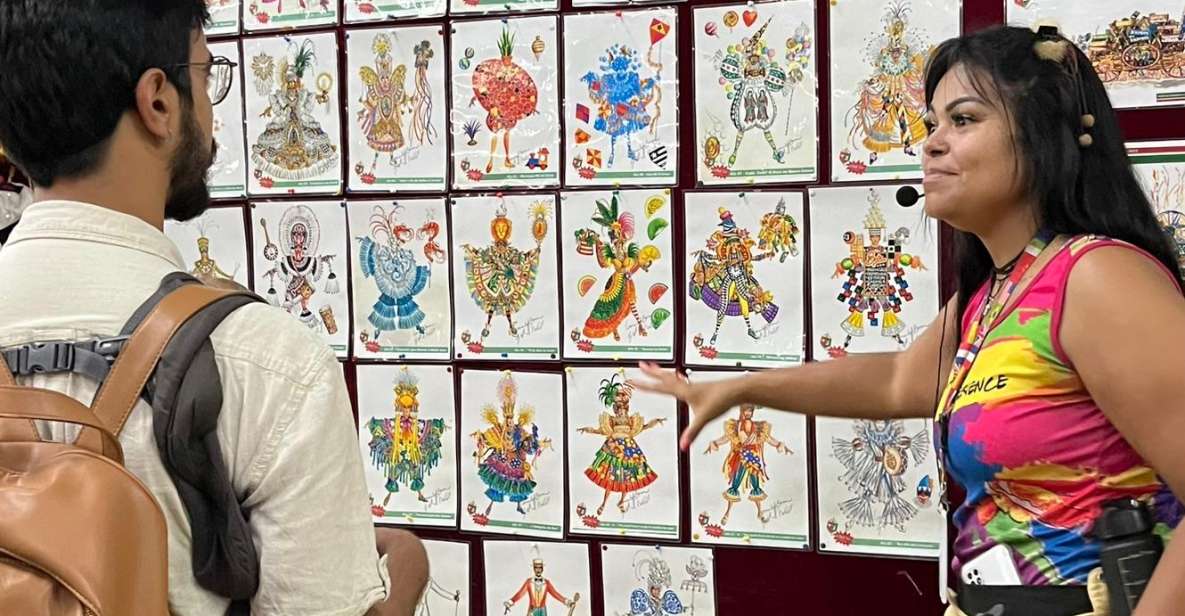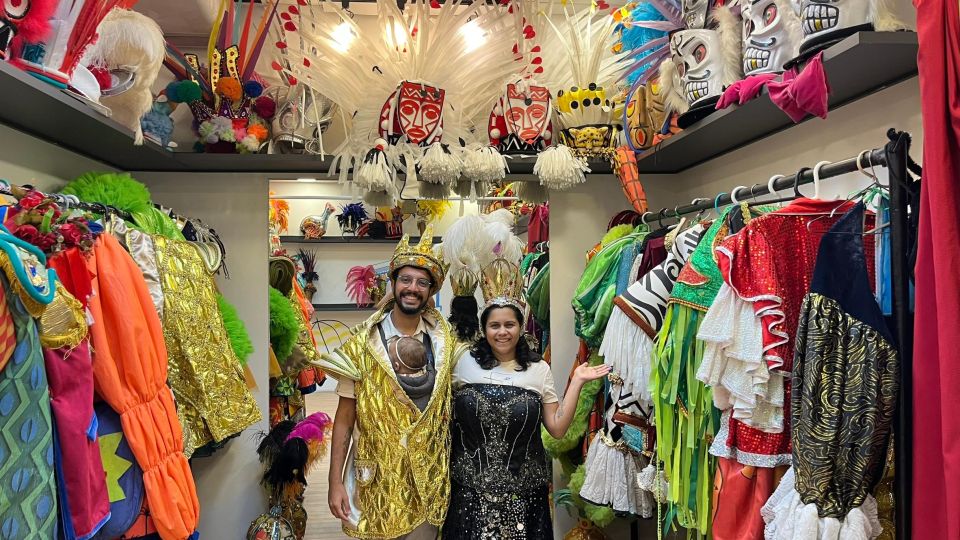The Little Africa: Samba and Carnival History
Step into the pulsating heartbeat of Rio de Janeiro’s Little Africa, where the rhythm of samba and the spirit of Carnival intertwine like vines in a lush jungle.
Discover the hidden tales of resilience, creativity, and celebration that echo through the cobblestone streets and vibrant alleyways.
As the sun sets over this historical enclave, the allure of the music and dance beckons, promising a journey that transcends time and space.
Join the expedition into the heart of this cultural oasis, where the past meets the present in a captivating dance of tradition and innovation, waiting to be unraveled with each step taken.
Key Points
- Explore Rio’s Little Africa neighborhood for an immersive Carnival experience.
- Learn about the rich history of Carnival, samba, and enslaved Africans in Brazil.
- Engage in behind-the-scenes Carnival preparations at the samba city and barracão.
- Enjoy trying on past Carnival costumes, learning samba steps, and savoring a traditional caipirinha.
History of Samba in Brazil
Samba, born in the vibrant streets of Brazil, pulsates with the rhythmic heartbeat of the nation’s cultural identity and history. Its evolution is deeply intertwined with the African influence that permeates Brazilian culture.
Originating from the fusion of diverse African musical traditions brought by enslaved Africans, samba emerged as a powerful form of expression and resistance. The rhythmic beats and lively melodies of samba reflect the resilience and creativity of those who shaped its beginnings.
Over time, samba evolved, incorporating elements of European music and Brazilian styles, becoming a symbol of national pride and a vibrant celebration of Brazil’s rich cultural heritage. The African influence remains at the core of samba, reminding us of the roots from which this iconic musical genre blossomed.
Enslaved Africans and Carnival Origins

With the pulsating rhythms of samba as a backdrop, the origins of Carnival in Brazil can be traced back to the experiences of enslaved Africans who played a pivotal role in shaping this vibrant celebration. Enslaved Africans brought their rich cultural heritage, including music, dance, and traditional customs, which laid the foundation for what would later become the extravagant and colorful Carnival we know today. Through their resilience and creativity, these individuals infused Carnival with elements of their African roots, creating a unique fusion of traditions that continues to be celebrated throughout Brazil. Their influence is evident in the lively performances, intricate costumes, and infectious energy that define modern-day Carnival celebrations, honoring the enduring legacy of enslaved Africans in Brazilian culture.
| Enslaved Africans and Carnival Origins |
|---|
| Rich Cultural Heritage |
| Music, Dance, and Tradition |
| Fusion of African Roots |
Little Africa: Cultural Significance

The cultural enclave known as Little Africa in Rio de Janeiro pulsates with a vibrant tapestry of traditions and history deeply intertwined with the roots of Brazilian Carnival. This neighborhood holds immense cultural significance, serving as a living testament to the African heritage that has shaped Brazil’s identity. Here, visitors can enjoy a world where past and present converge, experiencing firsthand the rich tapestry of cultural celebrations and traditions that continue to thrive.
Walking through the streets of Little Africa, one can feel the heartbeat of the community, resonating with the rhythms of samba and the spirit of Carnival.
- Colorful houses adorned with African motifs
- Lively street vendors selling traditional foods and crafts
- The sound of drums echoing through the narrow alleyways
- Murals depicting scenes of African folklore and history
Carnival Preparations and Samba City
Walking through the vibrant streets of Little Africa, visitors can witness firsthand the bustling energy of Carnival preparations as they explore the heart of Rio’s Samba City. Samba traditions come alive as colorful fabrics are meticulously sewn into intricate costumes, each stitch a testament to the dedication of those preparing for the grand festivities.
The air is filled with the sound of drums and laughter, creating a symphony of anticipation for the upcoming Carnival. At Samba City, artisans work tirelessly to craft elaborate floats, each one a masterpiece in its own right, ready to parade through the streets in a dazzling display of creativity and tradition.
Everywhere you look, the vibrancy and excitement of Carnival preparations are palpable, drawing you deeper into the magic of this cultural celebration.
Experience the Carioca Carnival Spirit
Enjoy the vibrant rhythms and rich traditions of the Carioca Carnival spirit as you explore the heart of Rio’s pulsating cultural celebration.
- Participate in energetic samba workshops
- Engage in culture through local traditions
- Feel the infectious energy of the Carnival spirit
- Learn the history behind the colorful costumes and lively dances
Experience firsthand the essence of Rio’s Carnival as you connect with the music, dance, and lively atmosphere that define this world-renowned celebration.
Through samba workshops and culture, you’ll gain a deeper appreciation for the traditions that have shaped the Carioca Carnival into the spectacular event it’s today.
Tour Details and Booking Information
Explore the vibrant history and booking details of the Samba and Carnival tour in Rio de Janeiro, offering an immersive experience into the heart of Brazil’s cultural celebrations.
Explore the rich Samba traditions and Afro Brazilian heritage as you embark on a 3-hour journey through Rio’s Little Africa neighborhood. With a live tour guide fluent in Portuguese and English, this small group tour limited to 10 participants ensures an intimate experience.
Highlights include visiting the samba city and barracão for carnival preparations, learning about African religion in Brazil, trying on past carnival costumes, and mastering samba steps with a professional dancer.
Priced at $68 per person, this tour provides a comprehensive look into the history and culture of Carnival, making it an ideal gift option or personal adventure for those seeking an interactive and engaging experience.
Common questions
Can Visitors Participate in Any Samba or Carnival Performances During the Tour?
Visitors can engage in participatory experiences like learning samba steps and wearing past carnival costumes during the tour. This culture provides insight into the vibrant history of samba and carnival, enhancing the overall experience.
How Has the Little Africa Neighborhood Evolved Over the Years in Relation to Samba and Carnival Culture?
The Little Africa neighborhood in Rio has evolved significantly over the years in relation to Samba and Carnival culture. From its roots in African traditions to becoming a vibrant hub for Carnival celebrations, the area showcases a rich history of cultural evolution.
Are There Any Traditional African Rituals or Ceremonies Incorporated Into the Carnival Preparations in Rio?
In Rio’s Carnival preparations, African traditions are vital. Tourists engage in cultural integration by learning samba steps and witnessing past carnival costumes. The tour offers an immersive experience into these rituals, providing insights into the rich history of Carnival.
What Are Some Lesser-Known Facts About the Costumes Worn During the Rio Carnival That Tourists May Find Interesting?
Tourists may discover that Rio Carnival costumes showcase intricate designs reflecting diverse cultural influences. From vibrant colors symbolizing joy to feathers representing freedom, each detail carries a story of Brazil’s rich heritage.
Are There Any Specific Guidelines or Etiquette That Visitors Should Be Aware of When Interacting With Local Residents in the Little Africa Neighborhood During the Tour?
When visiting the Little Africa neighborhood, travelers should respect cultural customs and engage respectfully with locals. Observing neighborhood etiquette, such as being courteous, open-minded, and embracing the community’s heritage, enhances the tour experience.
Last Words
Step into the vibrant world of Rio de Janeiro’s Little Africa and experience the pulsating rhythms of samba and the colorful energy of Carnival.
Enjoy the rich history and cultural tapestry of this iconic city as you dance to the beat of the music, explore the origins of Carnival, and indulge in the spirit of carioca culture.
Don’t miss out on this unique tour experience that promises to leave you captivated and inspired.